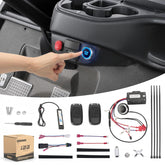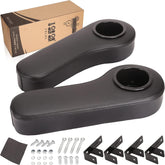How To Test A Golf Cart Solenoid ?
Testing a golf cart solenoid is relatively straightforward and can help diagnose whether the solenoid is functioning correctly or if it needs replacement. Here's how to test a golf cart solenoid:
Materials and Tools You'll Need:
- Digital multimeter (voltmeter)
- Safety goggles
- Safety gloves
- Basic hand tools (wrenches and screwdrivers)
- A friend to assist (optional)
Step-by-Step Instructions:
-
Safety Precautions: Before you begin, ensure the golf cart is turned off, and the key is removed from the ignition. Wear safety goggles and gloves to protect yourself.
-
Locate the Solenoid: The solenoid is typically located in the engine compartment of the golf cart. It's a cylindrical component with multiple terminals and is usually connected to the battery, controller, and motor.
-
Inspect the Wiring: Visually inspect the solenoid and its wiring for any signs of damage, loose connections, or corrosion. If you see any issues, address them before proceeding.
-
Testing for Voltage:
- Set your digital multimeter to the voltage (V) setting.
- With the key in the off position and the cart's pedal not pressed, check the voltage across the two large terminals of the solenoid.
- You should read the full battery pack voltage (e.g., 36 volts, 48 volts) across these terminals. If there is no voltage or significantly lower voltage, it could indicate a problem with the solenoid or its connections.
-
Testing the Activation Circuit:
- Have a friend assist you for this step or use a jumper wire.
- Turn the key to the "on" position, and press the accelerator pedal to activate the solenoid.
- While the solenoid is activated, use the multimeter to check the voltage across the two small terminals on the solenoid.
- You should read the full battery pack voltage again (e.g., 36 volts, 48 volts). If there is no voltage or significantly lower voltage, it may indicate a problem with the solenoid coil or the activation circuit.
-
Testing for Continuity (Optional):
- If you suspect the solenoid is faulty, you can test its continuity.
- Turn off the key and disconnect the wires from the small terminals of the solenoid.
- Set the multimeter to the continuity or resistance (ohms) setting.
- Place one multimeter probe on each small terminal. You should hear a beep or see a low resistance reading on the multimeter, indicating continuity. If there's no continuity, the solenoid may be faulty.
-
Replacing the Solenoid: If you've determined that the solenoid is faulty or not functioning correctly based on the above tests, it's advisable to replace it with a new one. Ensure you use a compatible replacement solenoid for your golf cart model.
-
Reconnect Wires: After replacing the solenoid, reconnect the wires to their respective terminals securely.
-
Test the Cart: Turn on the key and test the cart to ensure that it operates as expected. Make sure the solenoid clicks and the cart moves when you press the accelerator pedal.
If you are unsure about any of the steps or if you encounter issues during the testing process, it's a good idea to consult a professional mechanic or an expert familiar with golf cart accessories electrical systems for further assistance and diagnosis.









